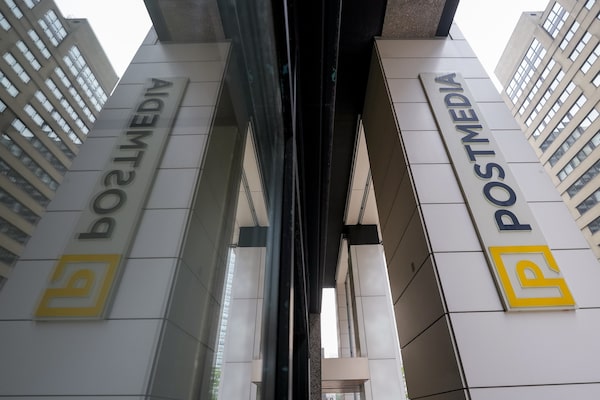
Postmedia's head office in Toronto, on June 28.Andrew Lahodynskyj/The Canadian Press
The country’s largest newspaper chains called off merger plans on Monday, with the owner of the Toronto Star citing “financial uncertainty” that came with a proposed marriage to debt-heavy partner Postmedia Network Canada Corp.
Postmedia PNC-A-T and Nordstar Capital LP, parent to the Toronto Star, said they were unable to reach agreement on terms of a deal, two weeks after they announced detailed plans to combine the two businesses. The potential transaction would have required approval from the federal Competition Bureau. In a press release on Monday, Postmedia and Nordstar said the lack of agreement on terms, and “the added backdrop of regulatory and financial uncertainty led them to make the decision to end their negotiations.”
Nordstar executives were concerned with Postmedia’s debt structure, even though Postmedia’s lenders were planning to swap the majority of the company’s loans for equity, according to a source familiar with the negotiations. The Globe and Mail agreed not to name the source because they are not permitted to discuss the transaction.
“These are challenging times for media companies, but we intend to keep working hard to give Canadians the news they need to stay informed,” said Jordan Bitove, owner of Nordstar and publisher of the Toronto Star in a press release.
In late June, Postmedia and Nordstar said combining forces would help the companies deal with the “existential threat” they face from tech platforms such as Facebook parent Meta Platforms Inc. and Google owner Alphabet Inc., which are winning an increasing amount of revenues from advertisers. The two tech giants have threatened to drop Canadian news content from their platforms because of a dispute with the federal government over Bill C-18, which will require them to pay news organizations for posting or linking to their work.
Postmedia owns 130 media properties, including daily broadsheet and tabloid newspapers in most major cities, while Nordstar has 70 titles.
Postmedia has $288-million in debt, and lost $36.7-million in the first six months of the year, after losing $26.5-million in the same period a year ago. In announcing negotiations with Nordstar last month, Postmedia said the merger “contemplates a significant reduction in overall debt through a conversion of a portion of the outstanding debt to equity.”
Postmedia announced merger talks after stock price spike
Why the merger of Toronto Star owner and Postmedia may not fix the companies’ financial issues
On Monday, Postmedia chief executive officer Andrew MacLeod said: “The need for creative solutions and foundational transformation in our industry remains.”
In an interview last week, prior to the end of talks, Postmedia investor and Florida-based hedge fund manager Leon Cooperman said: “Consolidation is the only solution to this industry’s problems. Big synergies are likely to come out of a deal.”
Postmedia’s $316-million acquisition of the Sun Media newspaper chain, completed in 2015, was also pitched as a crucial move to compete with tech platforms for ad spending while providing quality journalism to local communities. The transaction created the largest newspaper chain in Canada but also sparked fears about job losses and newsroom closings. While management vowed to keep operating competing titles in the same markets, Postmedia cut 90 jobs and merged newsrooms in Vancouver, Calgary, Edmonton and Ottawa less than a year later.
Between 2017 and 2022, Postmedia shed more than 1,200 full-time employees while revenue fell 39 per cent to $458-million. In 2020, Postmedia shut down 15 community newspapers in Manitoba and Ontario, and earlier this year shifted a dozen Alberta titles to a digital-only format. Management also announced cuts to 11 per cent of the company’s 650 editorial employees.
All of the cost-cutting has affected the amount and variety of original reporting in Postmedia papers. “We had much better content in the past, but we had to let a lot of it go because of what we are,” former Postmedia chair Paul Godfrey said on a recent podcast for the Canadian Jewish News. “We’re not The New York Times.”
The parent company of the Toronto Star has similarly slimmed down over the years. The firm sold its Harlequin book publishing division in 2014, spent millions on an unsuccessful tablet app, outsourced printing operations, sold real estate, and shut down a number of newspapers. The company struck a deal with Postmedia in 2017 to swap 41 newspapers only for both publishers to shutter most of them in a cost-savings gambit. The Competition Bureau investigated the transaction but closed its probe in 2021 without taking further action.
Headcount has fallen, too. The number of unionized employees at the Toronto Star dropped from 610 in 2009 to 178 last year, while the Hamilton Spectator has gone from 261 to 86 employees, according to Unifor, the largest media union in Canada.
Mr. Bitove and former business partner Paul Rivett purchased Nordstar for $60-million in 2020, by which time its stock had fallen 99 per cent from a peak more than a decade prior. The new owners diversified into parcel delivery and online gaming, but the pair soon had an acrimonious falling out. Mr. Bitove took ownership of the Toronto Star and the Metroland chain of community titles after an arbitration process late last year.
Under the terms of the now-cancelled merger, existing Postmedia shareholders were to own a 56-per-cent economic interest in the combined companies, with Nordstar holding a 44-per-cent stake. Mr. Bitove was to retain a 65-per-cent stake in the Toronto Star, which would become a separate company. Mr. Bitove was to be chairman of the combined companies while Mr. MacLeod was CEO.
Postmedia owns the Vancouver Sun and Province newspapers, Edmonton Journal, Calgary Herald and Montreal Gazette. Nordstar’s portfolio includes the Hamilton Spectator and the Waterloo Region Record.